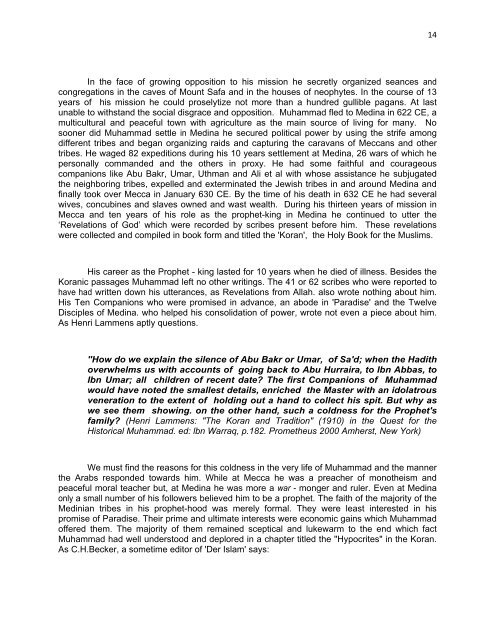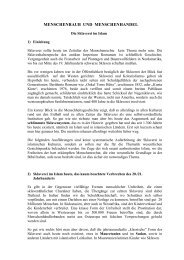THE MISERY OF ISLAM
THE MISERY OF ISLAM
THE MISERY OF ISLAM
You also want an ePaper? Increase the reach of your titles
YUMPU automatically turns print PDFs into web optimized ePapers that Google loves.
14In the face of growing opposition to his mission he secretly organized seances andcongregations in the caves of Mount Safa and in the houses of neophytes. In the course of 13years of his mission he could proselytize not more than a hundred gullible pagans. At lastunable to withstand the social disgrace and opposition. Muhammad fled to Medina in 622 CE, amulticultural and peaceful town with agriculture as the main source of living for many. Nosooner did Muhammad settle in Medina he secured political power by using the strife amongdifferent tribes and began organizing raids and capturing the caravans of Meccans and othertribes. He waged 82 expeditions during his 10 years settlement at Medina, 26 wars of which hepersonally commanded and the others in proxy. He had some faithful and courageouscompanions like Abu Bakr, Umar, Uthman and Ali et al with whose assistance he subjugatedthe neighboring tribes, expelled and exterminated the Jewish tribes in and around Medina andfinally took over Mecca in January 630 CE. By the time of his death in 632 CE he had severalwives, concubines and slaves owned and wast wealth. During his thirteen years of mission inMecca and ten years of his role as the prophet-king in Medina he continued to utter the‘Revelations of God’ which were recorded by scribes present before him. These revelationswere collected and compiled in book form and titled the 'Koran', the Holy Book for the Muslims.His career as the Prophet - king lasted for 10 years when he died of illness. Besides theKoranic passages Muhammad left no other writings. The 41 or 62 scribes who were reported tohave had written down his utterances, as Revelations from Allah. also wrote nothing about him.His Ten Companions who were promised in advance, an abode in 'Paradise' and the TwelveDisciples of Medina. who helped his consolidation of power, wrote not even a piece about him.As Henri Lammens aptly questions."How do we explain the silence of Abu Bakr or Umar, of Sa'd; when the Hadithoverwhelms us with accounts of going back to Abu Hurraira, to Ibn Abbas, toIbn Umar; all children of recent date? The first Companions of Muhammadwould have noted the smallest details, enriched the Master with an idolatrousveneration to the extent of holding out a hand to collect his spit. But why aswe see them showing. on the other hand, such a coldness for the Prophet'sfamily? (Henri Lammens: "The Koran and Tradition" (1910) in the Quest for theHistorical Muhammad. ed: lbn Warraq, p.182. Prometheus 2000 Amherst, New York)We must find the reasons for this coldness in the very life of Muhammad and the mannerthe Arabs responded towards him. While at Mecca he was a preacher of monotheism andpeaceful moral teacher but, at Medina he was more a war - monger and ruler. Even at Medinaonly a small number of his followers believed him to be a prophet. The faith of the majority of theMedinian tribes in his prophet-hood was merely formal. They were least interested in hispromise of Paradise. Their prime and ultimate interests were economic gains which Muhammadoffered them. The majority of them remained sceptical and lukewarm to the end which factMuhammad had well understood and deplored in a chapter titled the "Hypocrites" in the Koran.As C.H.Becker, a sometime editor of 'Der Islam' says:



